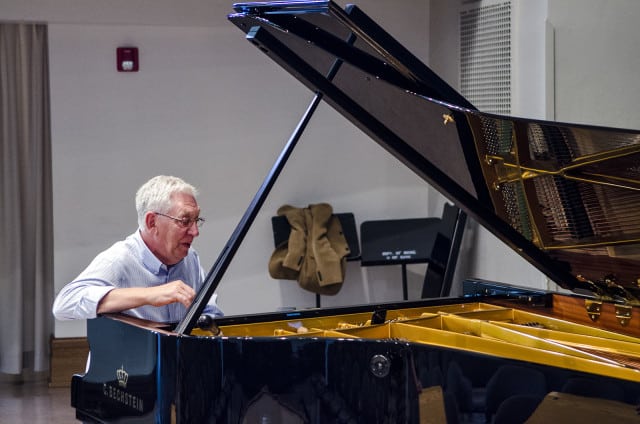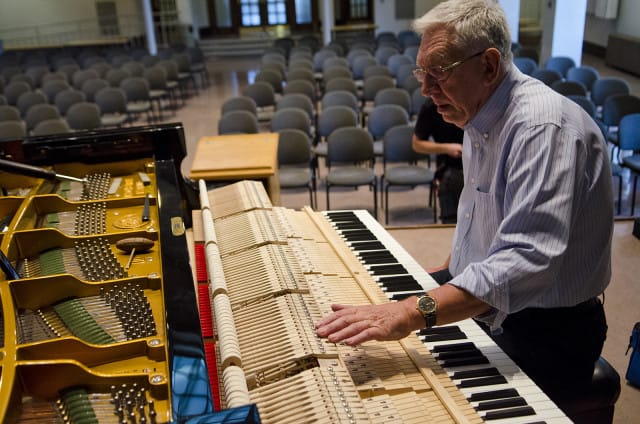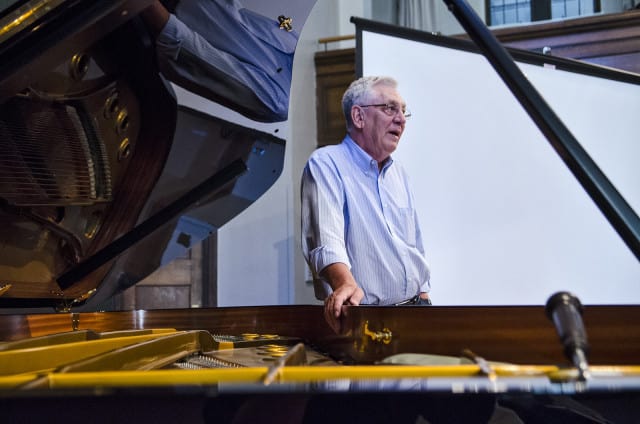
Piano technician Roger Jolly leans on the Bechstein Model D concert grand piano that he and his wife recently donated to the U of S.
This past Saturday morning the emphatic plunk plunk of a piano being tuned could be heard through the doors of Convocation Hall. It was a bright and dissonant sound, even muffled by the doors, coaxed out of the piano while the instrument’s guts were tweaked and tuned to perfect each note.
I let myself into the empty hall and found piano technician Roger Jolly engrossed in his work.
He was perched on the edge of his bench, leaning over the case of the Bechstein Model D concert grand piano that has taken over the hall’s comparatively small stage. One hand tapped at the keyboard while the other worked a tool to tighten or loosen the piano’s strings. Jolly was so absorbed that at first he didn’t notice me watching him work. When he finally glanced up and saw me he seemed somewhat startled to find that he had an audience.
Roger Jolly and his wife Marie, owners of the Yamaha Piano Centres in Saskatoon and Regina, recently donated the eight-foot Bechstein concert grand to the University of Saskatchewan.
According to Jolly, the university’s new Bechstein is one of the top 10 pianos in the country in terms of quality and craftsmanship.
“There’s probably no more than half a dozen modern era [Bechsteins] in Canada,” said Jolly. “They’re manufactured in Berlin and are the top one or two pianos in the world, quality wise.”
Jolly and his wife decided to donate the piano to the university now so they can enjoy the fruits of their generosity before they, as Jolly joked, “kick the bucket.”
“I kind of feel the students around here needed something better than they had, so that they could get their hands on something that was really world-class,” Jolly told me. “[That way] they know where the standard of world-class really is.”
Jolly had the Bechstein partially disassembled, with the keyboard and action pulled out of the piano so he could fine tune the feel of each individual hammer. When I asked for a chance to play it, he slid the action back into the sleek black frame of the instrument.

The Bechstein is crafted from the highest quality materials in the world. It’s put together with the help of not only some of the finest piano craftsmen in Europe, but also computer guided machinery that precision mills the instrument down to 4/1000th of an inch.
I’ve played some wonderful grand pianos before, like the Yamaha S6 grand at the Bassment jazz club downtown. I’ve also loitered around Jolly’s piano centre on Broadway and sampled some of the instruments they have on their display floor, including, one time, a stripped-down Wurlitzer grand in the back of their repair shop.
But I’ve never played anything quite like the Bechstein.
The action felt like silk and the keys were more responsive than any other piano I’ve played. Concert grand pianos like the Bechstein are designed to whisper at the lightest touch and then fill an entire concert hall with sound when played vigorously — all without any amplification. Each note rings out far clearer and longer than on lesser pianos.
I was extremely pleased (if not slightly nervous) to have an opportunity to play a world-class piano. I’m not a music student, so I wasn’t going to have any “official” chances to sit at the Bechstein. If I hadn’t stolen a chance to play it last weekend with Jolly looking on, I would have schemed all year to find a way into Convocation Hall unsupervised.
When I asked Jolly why he chose the Bechstein, he said he bought it on a whim. I was surprised — a $200,000 purchase is quite a whim.
Jolly was in Los Angeles doing work for the Bechstein company when he fell for the model D. This particular Bechstein had been in concert service for a year before he bought it, played by some of the top artists in the world.
“When you have two or three world-class pianos sitting side by side,” said Jolly, “and you can go backwards and forwards, there’s a little magic that comes out of it. And you say yeah, I think that’s worth buying.”
The Bechstein will now call Convocation Hall its permanent home. Jolly said that the hall is one of the finest spaces he could have imagined to house a piano of the Bechstein’s calibre. The room has almost perfect acoustics to compliment the instrument’s voice.
For most pianists, like me, playing a piano like the Bechstein is a rare and privileged experience. This is because the pianist can trust the instrument to perform flawlessly, each and every time they sit down to play. It fosters a kind of musician-instrument relationship that you can’t find elsewhere.
“The pianist sits on the bench and relaxes,” said Jolly. “They can concentrate on the music because they’re not worried about what the piano will or won’t do.”
But even on a Bechstein this flawless consistency doesn’t happen magically. Atmospheric conditions, wear and tear, or even playing the piano a single time will put it out of tune ever-so-slightly. It takes the work of a master piano technician to keep the instrument meticulously maintained, and maintaining it is an endless task — Jolly will tune the Bechstein every three weeks.

Jolly will tune and maintain the Bechstein every three weeks, or depending on performances, up to three times a week.
Jolly equates the challenges he faces as a concert grand technician to those a piano player faces while learning a piece of music.
“When is a pianist satisfied with a piece of music? The answer is never. A good concert piano technician will give you the same answer.”
As I left Convocation Hall, Jolly was back where I found him, plunk plunking away. Jolly may have donated the piano to the university, but I imagine he’ll still be getting more than enough personal time with the most elegant grand piano Saskatchewan has ever seen.
—
Photos & Video: Bryn Becker/The Sheaf
Additional video footage courtesy of Mark Ferguson
Leave a Reply